Silent prayers in sacred streams
When everything is grief and we have nothing left to offer, the meaning of "holy" remains.
Last weekend, for the first time this year, my husband and I managed to get away and have a few days to ourselves. We packed up our car and drove south, leaving our sweet, poorly little Humphrey with a dear friend who is patient and caring enough to deal with all of his idiosyncrasies and complex medication schedules.
After spending nearly an entire year in Humphrey’s company, I fear I’ve developed a sort of Stockholm Syndrome: I know that I need respite from his demanding care; I also struggle to be away from him. Even as I type this, I know it sounds insane. It isn’t healthy when the human is the one with separation anxiety.
But this is my reality: I have adapted my lifestyle to accommodate and care for this sick dog. To be suddenly free of the responsibility, even for a few days, feels a bit like removing shackles which, however uncomfortable, my body has grown used to.
Nevertheless, I’d been looking forward to this trip. My husband and I needed rest – not just in the form of uninterrupted sleep, but the rest which comes from exploring a new place and being revived by the delight of falling in love with adventure again.
Up until we brought Humphrey home, our favourite pastime had always been walking and exploring new places. Half of our favourite spots in the Peak District were discovered simply by driving with no goal at all but to see what was around the next corner. It’s one of my favourite parts of our marriage – our mutual love of exploring at a slow, curious pace. And it’s just one more thing that I’ve grieved the loss of as our sick little dog proves consistently too anxious to travel.
My hope was that in spite of how Humphrey’s ongoing medical conditions have permeated every nook and cranny of my life, I could somehow employ that useful skill which men seem to exercise so easily: the blessed art of compartmentalising. I’d organised a puppysitter and found a stunning little Air BnB in a town just outside Bath, all with the express goal of “switching off” and recovering a little joy with my equally exhausted husband.
Friends, I won’t go to the trouble of explaining how badly I failed at this compartmentalisation from the moment we got out of the car. As we got settled into our perfect little flat and walked around the most stunning English town I’ve ever seen (and I’ve done a lot of “seeing” over 12 years as an English-dwelling Anglophile), I couldn’t stop the persistent inner dialogue that was attempting to rob me of my joy every time I saw a dog walk past:
Will we ever get to explore like this with Humphrey?
Will he ever get better?
Why did God give us a dog who is so sick?
What if he dies young? What if I lose him? Who will I become in light of that kind of grief?
A similar string of questions consistently ran through my head as I spotted babies smiling and having their cheeks squished by doting parents; for within hours of arriving at our lovely little getaway, I had started bleeding: another weird symptom which is now a sporadic, unusual precursor to what will be an incredibly painful menstrual cycle in a few days’ time – and another reminder that my body is a walking question mark when it comes to the subject of motherhood.
We’d walk down those storybook streets, and in one breath, I’d cry “This is the most magical place I’ve ever seen!” while in the next breath, I’d whisper inside my head: Will I ever be rid of this grief?
“Why do you always make things so heavy at the end of a wonderful day?”
My high school boyfriend was the first person to point it out. That relationship wasn’t healthy, and our arguments were rarely productive, so for years I dismissed the question out of hand, but it stayed with me.
It wasn’t until my husband asked me effectively the same question in gentler words many years later that I realised this was indeed a pattern of mine: in spite of some of the happiest days, I had a skill for sinking into a deep sadness, a deep dissatisfaction, like a leech I couldn’t pry off my skin. And then I’d eek the sadness out to poison the people around me.
I resolved to figure out why I would plunge into the depths of despair during times that I should, in theory, be digging myself out of it: vacations, meals out, birthdays, holidays, being around people I love and doing things that bring me joy. I’d find myself sad, almost angry, at the world, at the feelings inside me, at the people around me who didn’t seem to understand (could I be any more of an Enneagram 4?)
But I didn’t want to be this way. I wasn’t angry at anything as much as I was angry at myself. I wanted joy. I believe in joy as one of the most radiant fruits of the Spirit, and it’s the fruit I always pray to bear most in any room I walk into. Yet here I am, raining on every lovely little parade. And for years, I didn’t understand why.
The words of my coach echoed through me now as I walked the streets of Bradford-on-Avon with my husband. A year ago, on my 30th birthday, she and I had wandered around London together, talking and hugging and enjoying the fact that we were both on the same continent: “Everything is grief,” she’d said. “From road rage to bereavement to fear – it’s all grief. It’s all an instinctive reaction to a world that is so far from perfect, so far from how we wish it would be.”
I hated the truth of those words the minute I heard them, but I also, in a way, found them to be a relief. It was like I’d found permission not to indulge my depression but to understand it. Not to boast of my sadness but to have compassion for it. For as long as grief persists, I at least don’t have to assault myself with shame when, on weekends like this one now, I walk through streets that are straight out of a fairytale and I still cannot ease the heaviness in my mind, my body, my spirit.
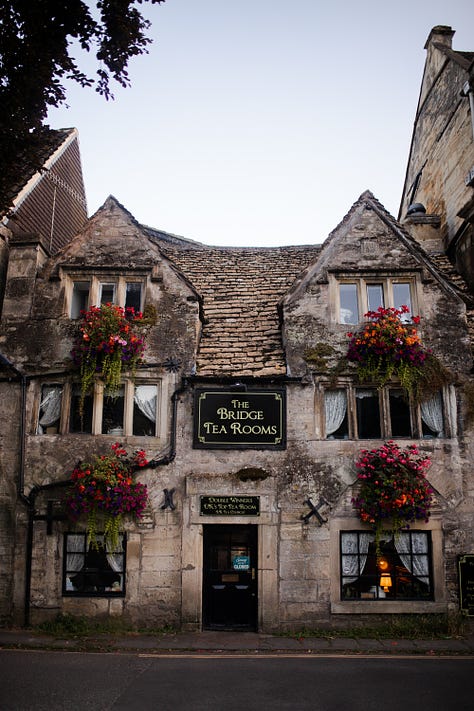
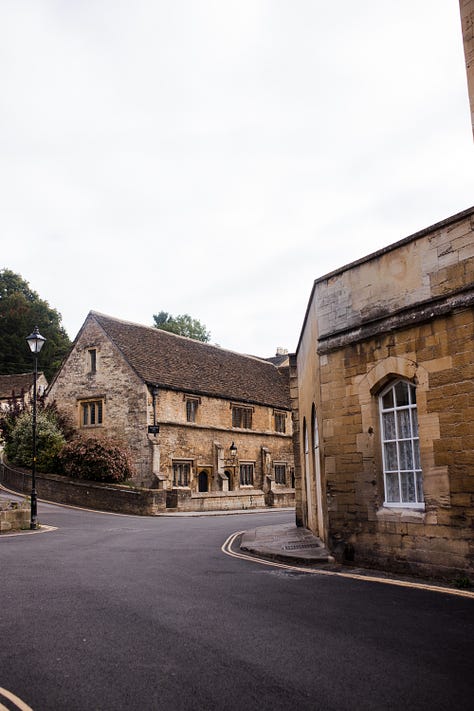
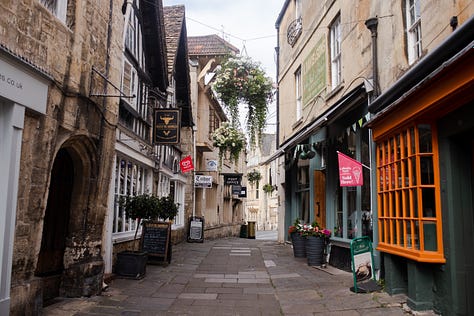
I have gotten better at identifying the sadness without letting it take over, partly because I have compassion for the part of myself that is grieving. I listen to her and I let her weep, and then I look around me and soak in the sweet feeling of my husband playing with my hair as we stare out the window on a train bound for Bath – even if that train carries two little toddlers who remind me of my confusing ache to be a mother. I hold grief and joy in both hands, and instead of practising the art of compartmentalising, I practise the art of making space for two things to be true at once: I am joyful, and I grieve. Grief does not erase joy. What a relief.
On our last morning in Bradford-on-Avon, Chris and I both woke up early. We’d taken turns having fitful sleep all weekend (alongside the bleeding, I’m in the middle of a flare in my joints, so sleeping is painful). By 6am on Sunday, we were both wide awake. So we got out of bed, got ready, and packed our bags for check-out. As I washed my face, that familiar, warning ache curled its fingers around my uterus. Because I am also having a flare in my joints, I’m on a different medication regime, meaning I couldn’t take painkillers for the period pain until after breakfast. But nowhere was open for food in this sleepy town for another 3 hours.
So I laid on the couch, trying to be as still as possible, and I texted my friend to check in on Humphrey – apparently, his GI symptoms had worsened. My mind started racing, preparing myself for another week of vet visits and unpredictable behaviour. My uterus throbbed with a twisted sort of ache. My joints shot a searing pain through my legs.
Everything is grief.
By 8am, the car was loaded, and we decided to take one last stroll through the town as the glorious sunshine kissed the quiet streets and we found ourselves walking through a postcard. I followed my husband as he slowly led us in the direction of an Anglo-Saxon church we’d stumbled upon the night before.
Brief history lesson for you: Saxon churches in England are exceedingly rare, most of them having been destroyed by the Normans following the Norman invasion of 1066. You’ll find, actually, that most churches bear the scars of humanity’s cruelty because history is seeped in war.
My husband is a stonemason, so he’s particularly interested in how these structures tell a story of desecration and repair; as denominational differences and fights for power attempted to rip down these ancient places of worship, but then acts of hope and obedience rebuilt them again.
When we’d stumbled across this church the previous evening, we were struck by how, well, I can’t find any other word for it, how humble it was. Not humble in the sense that it wasn’t grand. No. It was an impressive structure, especially given its age (it’s suspected to have first been erected in 700 AD). What was humble about it is that its caretakers had made no effort to boast of its rare status as a Saxon relic: there was no attempt to capitalise on its worthiness as a tourist attraction. Apart from a simple, wooden sign which labelled it a Saxon church, it simply stood there, quite unsuspecting, pretending to be nothing other than what it is: a human effort to harbour a place where Christ can be worshipped.
I’d spent the rest of the evening listening to my husband read me whatever historical facts he could find about the church as we ate our dinner in the warm, balmy British sunshine. We looked at photographs of the inside, wishing the doors had been open so that Chris could explore the further tales held within.
As I followed him back up the gentle hill on Sunday morning – the hill which led to this humble little church – the bells from the grand, well-established Norman church sang out across the street. Everyone was gathering for Sunday service in the Norman building while the Saxon one stood empty. And to our delight, its doors were now open.
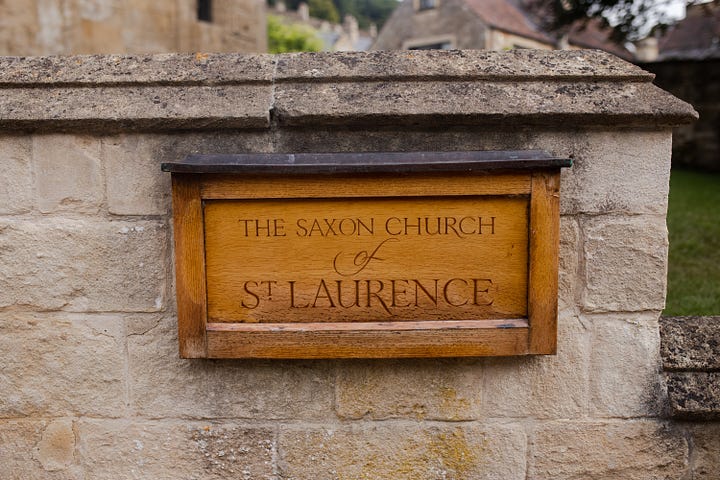
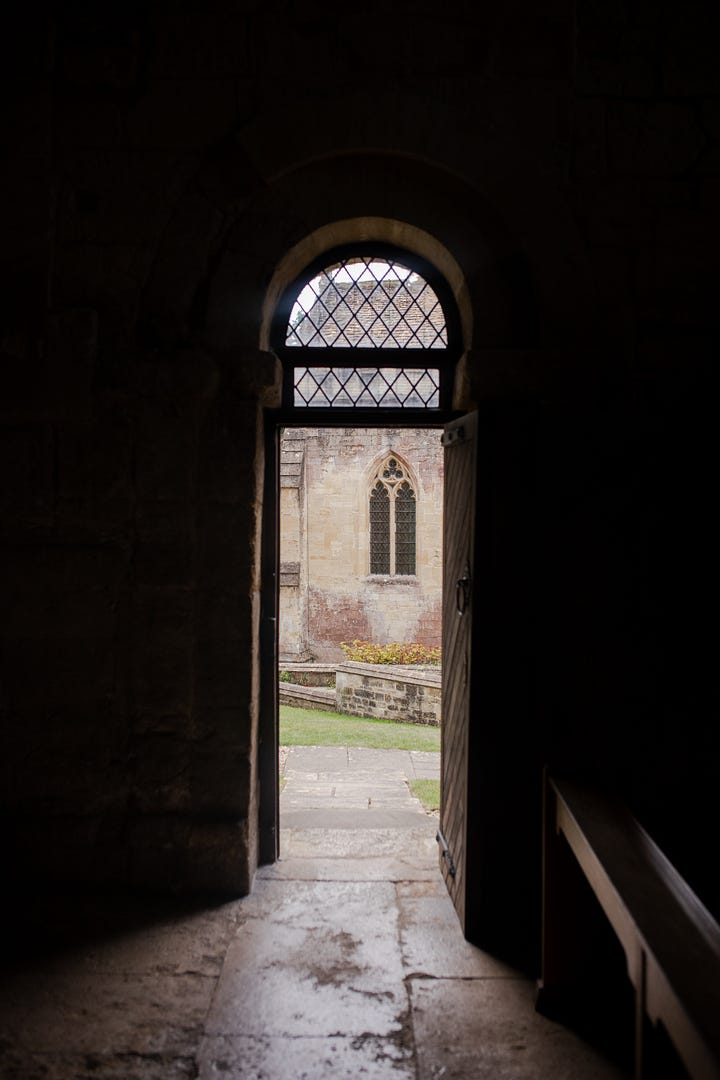
Without pain medication, the twisting ache was now clenching its fists tightly around my uterus, and I walked the last 10 metres up the hill clutching my stomach, trying to hold the pain in place, willing it not to spread.
We walked through the tiny doorway and I collapsed in one of the wooden pews. What stood before me was simple and dark and unremarkable compared to Bath Abbey (which we’d toured the previous afternoon) or even the Norman church with its ringing bells across the street.
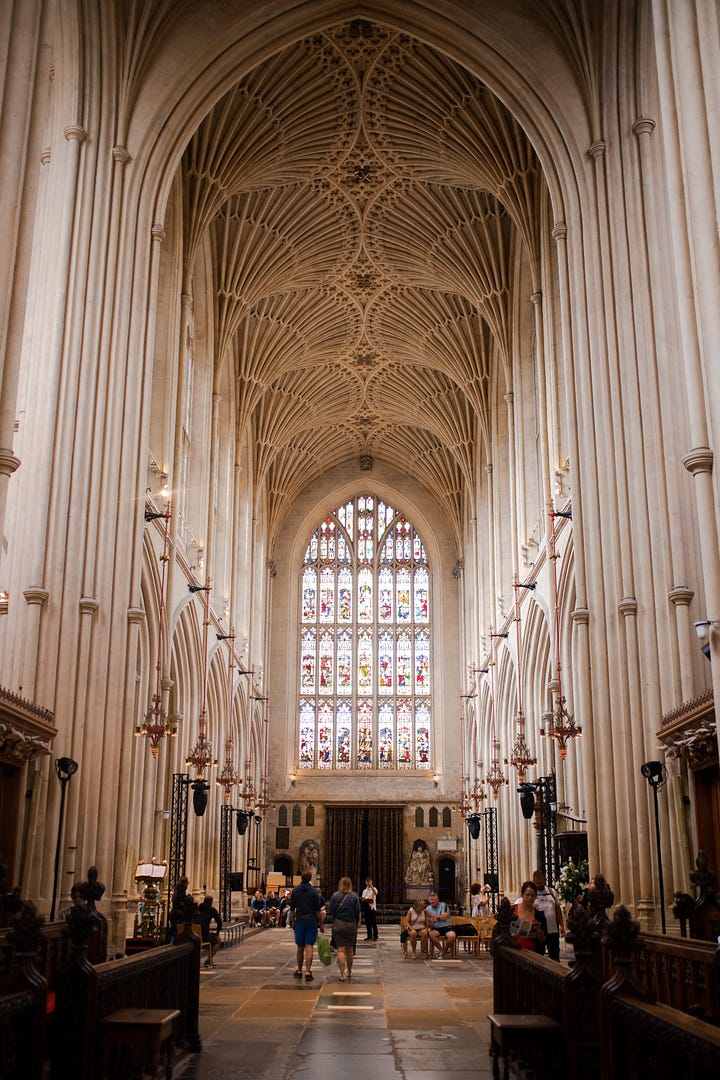
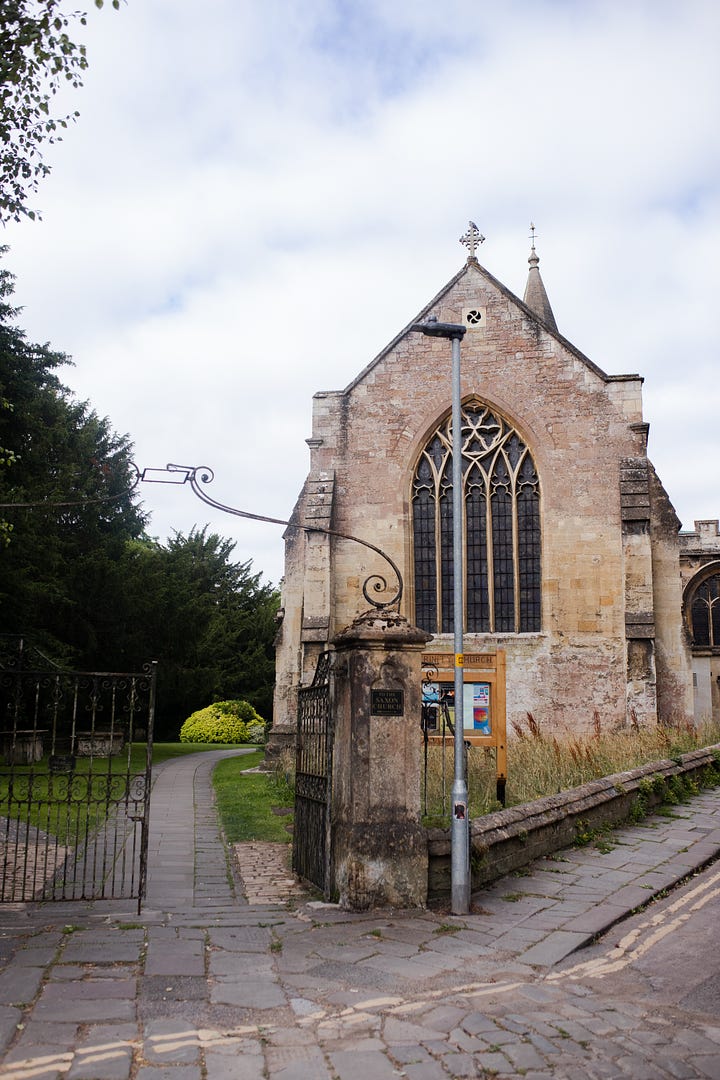
But man, it was beautiful.
Its high ceilings and few windows threw brilliant streams of sunlight through the heavy shadows. Chris wandered around, running his hands across stones which spanned centuries, and I sat on that wooden chair, breathing slow and deep, fighting the pain that was hurling itself like waves through my body – fighting the fear of what new griefs awaited us when we headed home in a few hours. Chris stroked my back as I kept my head between my knees, waiting for the pain to ease.
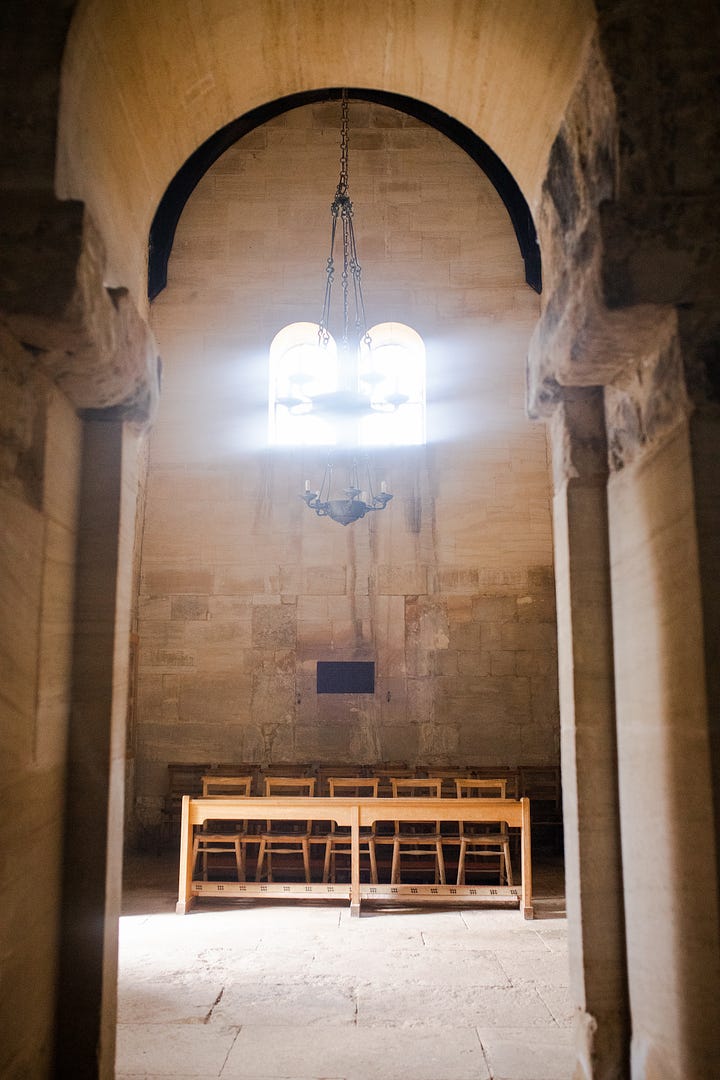
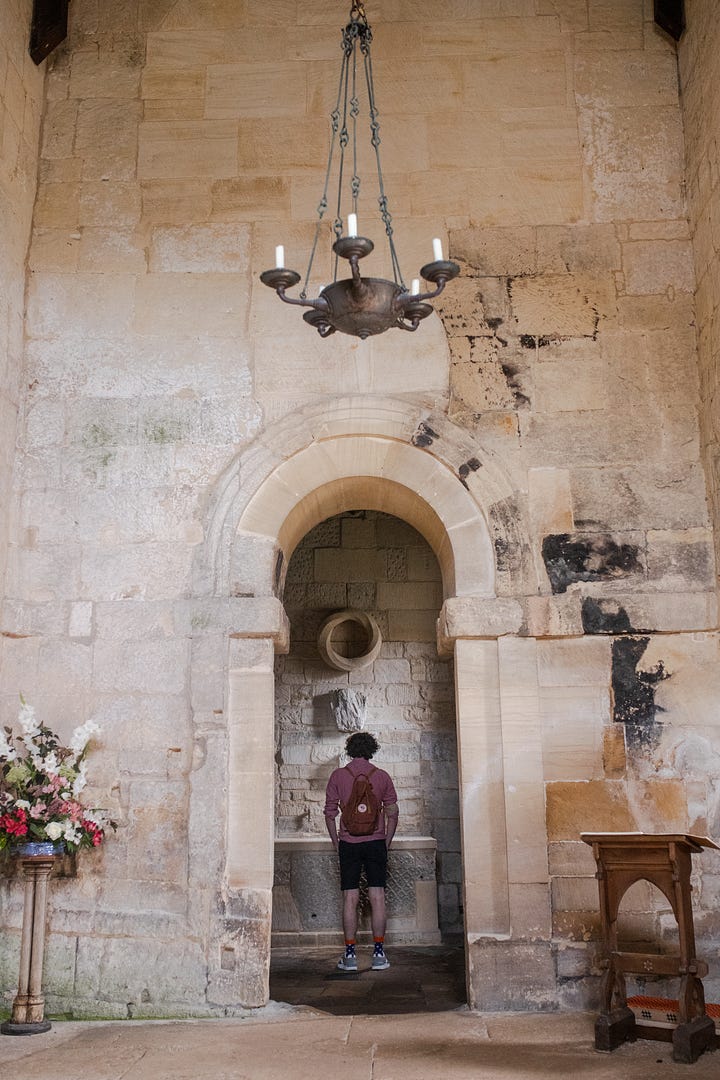
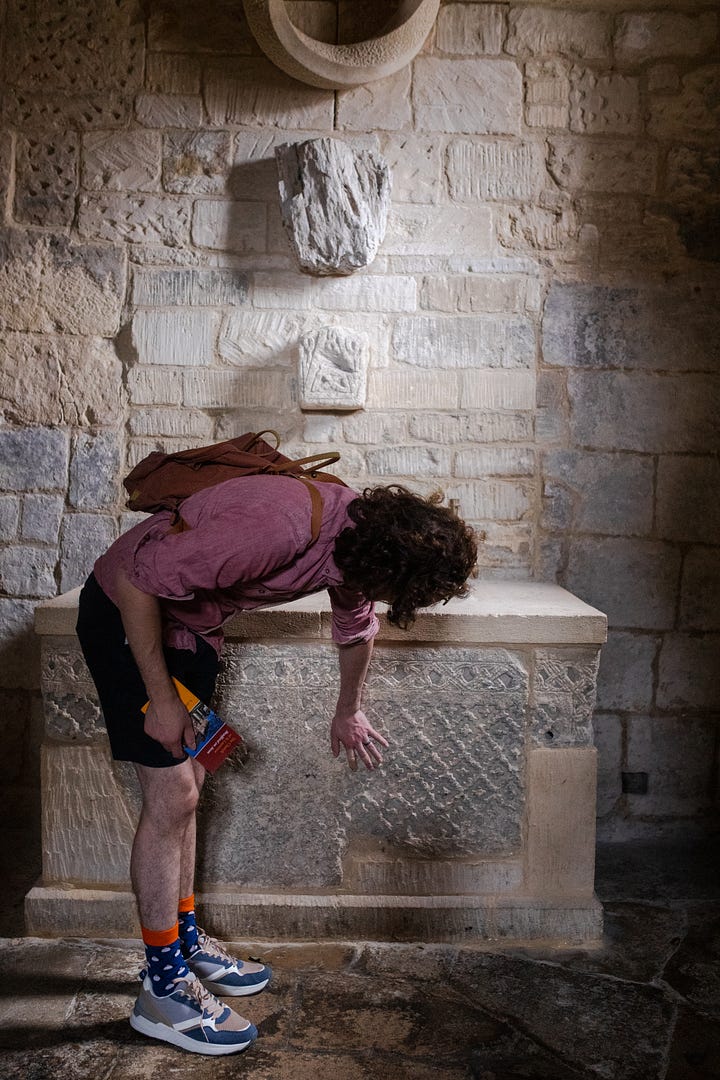
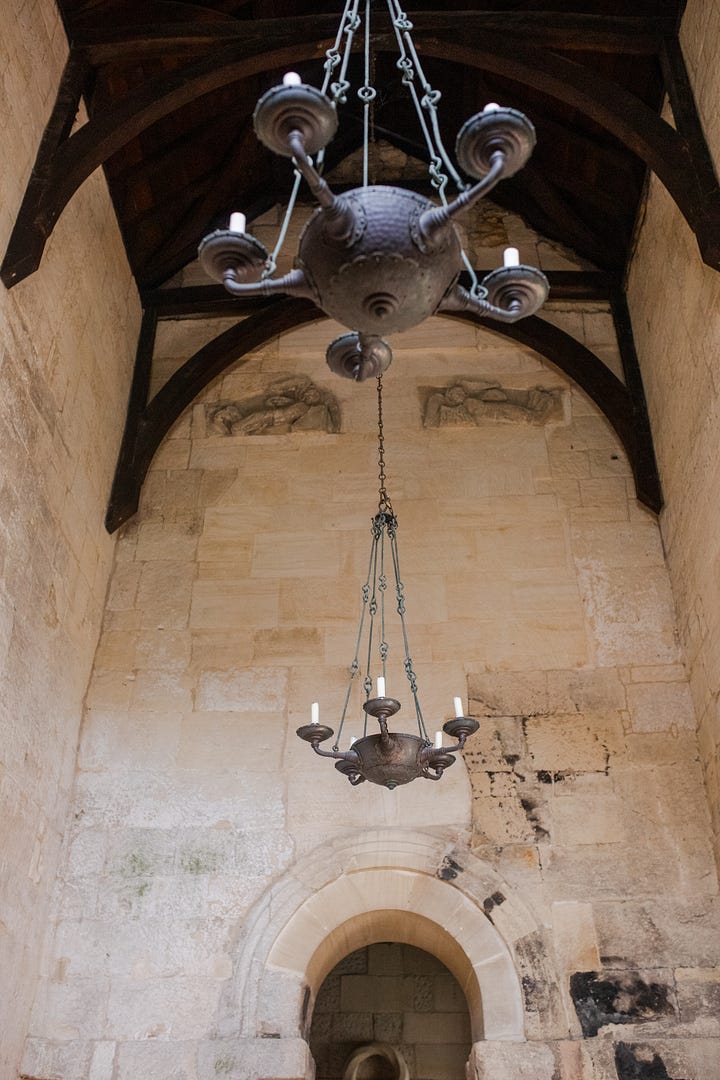
Finally managing to stand, I headed for the door (“need food to take meds,” my brain said), but Chris stopped me.
“Before we go,” he said, taking my hand, “I just feel like this is a place we need to pray. This church is special. I can feel it.”
“I can too,” I whispered. And I could. He was right. I could feel something earnest in the pores of the stone. Something unspoken told my spirit that this was a “thin place” – a place where centuries upon centuries of Christ-followers had, like stonemasons, chipped away at the spiritual barrier separating us from the unseen world.
We approached the altar. It still bore the marks of Celtic artwork made by men who shared my husband’s trade over a thousand years ago. I longed to enter into this ancient stream of sacred worship, but my evangelical background left me ignorant of any sacramental words I could utter here other than The Lord’s Prayer.
Plus I was already fighting back tears. I couldn’t speak. My hands grazed the altar stone, and I couldn’t shake the compulsion to kneel. So slowly, I got down, curling myself over my throbbing uterus, kneeling beneath the weight of glory I knew was present in the room.
I’m a writer. It’s one of the most defining things about me. Words spill out of me like water from a broken dam. But as my palms flattened against the stone floor, I could think of nothing. My most abundant gift – the ability to string together a pretty sentence – felt worthless in this place. I had nothing to say, nothing to offer, my body broken, my mind riddled with fear. All that ran through my head, again and again, as I sobbed, was “Holy, holy, holy are you, Lord God Almighty.”
The stone beneath my knees turned dark in splotches as it absorbed the tears of my silent prayer. “Heal me, Lord. Heal me.”
All my life, I’ve felt this burden and this need to use my words. To create something profound. To be part of building those holy encounters with God as an act of partnership and dignity and participation in the beautiful life He’s given me.
I was not dignified (by a human standard) in this moment.
But there was something far more profound about falling to my knees, unable to hide from my own weakness, unable to see myself as anything but a mound of dust. A mound of dust that, for some reason, the Almighty chooses to love.
Holy, holy, holy are you, Lord God Almighty.
And suddenly, I had stepped into that ancient, sacred stream – into the worship that my Saxon ancestors, and many generations hence, had soaked into these stones the way my tears were soaking them now.
The woman with the issue of blood popped into my mind as I knelt before the altar. Far from striving to fabricate some sort of feeling or string together some pretty prayer, I simply rested in the kinship of her desperate need – and her unshakeable devotion to faith in the Holy God standing before her. The God made man. The divine body carved of the same dust from which I am carved. The redeeming love that was poured out like water for me.
Heal me, Lord. Please heal me.
It was a prayer for my body. For my family. For my friends. For my dog. For my marriage. For my life. For my countries. It was a prayer for the fact that everything is grief. And it was also a moment of rest, and relief, because it was a prayer for something that I knew, in this thin place, had already been answered at the Cross.
The altar before me bore the marks of worshipping craftsman from nearly 2,000 years ago. It bore the mount of a fossilised tree nearly 3 million years old. It bore the top of a cross, refashioned by stonemasons from 2012. It is the confirmation, from generations of saints, of my silent prayer: He is holy. And everything that holiness entails is the healing that will one day consume all of my grief.
Maybe this is what Paul meant when he said that Christ’s power is made perfect in our weakness. Because while I still firmly hold true to the belief that God invites us to partner with Him by using our gifts to build beauty and goodness and “Kingdomness” in this world, there is an ever-present, all-consuming, mind-boggling truth that even when our gifts fail us, even when my words go missing and I can’t string together a pretty prayer, the weight of His glory remains. No, it consumes.
The peace that washed over me had nothing to do with me and everything to do with me all at the same time. My brokenness, my desperate need to be healed of every sickness and sorrow and grief – it all felt inextricably linked to the truth that Christ is holy, his holiness swallowing up not just the sins of the world but its suffering, too:
Surely he took up our pain
and bore our suffering,
yet we considered him punished by God,
stricken by him, and afflicted.
But he was pierced for our transgressions,
he was crushed for our iniquities;
the punishment that brought us peace was on him,
and by his wounds we are healed.Isaiah 53:4-51
Everything is grief, but because of Jesus, everything is joy, too.
I rose from that spot, tears still pouring down my face, peace still surrounding me. The sound of a visiting tourist and her little dogs entered, and we were pulled from our silence. So my husband and I took hands and walked out.
“The pain is gone,” I said as we walked back down the hill. And it had. The fist had unclenched deep inside me, and I was able to walk without gripping my stomach and holding myself together.
Under his breath, I heard my husband whisper. The words themselves were the answer to a 7-year long prayer:
“Praise be to God.”
“Praise be to God,” I echoed.
And we headed to the high street for breakfast, everything feeling, by no power of our own, a bit lighter, a bit more hopeful, a bit more like the world we are promised will one day be. And until that day, I hold onto the truth that I don’t need to do a single thing to be loved by the Holy of Holies.
By his wounds we are healed.
Praise be to God indeed.
All my love,
This scripture was literally part of my pre-scheduled Bible reading this morning. I had no idea. But God did. Coincidence? I think not.





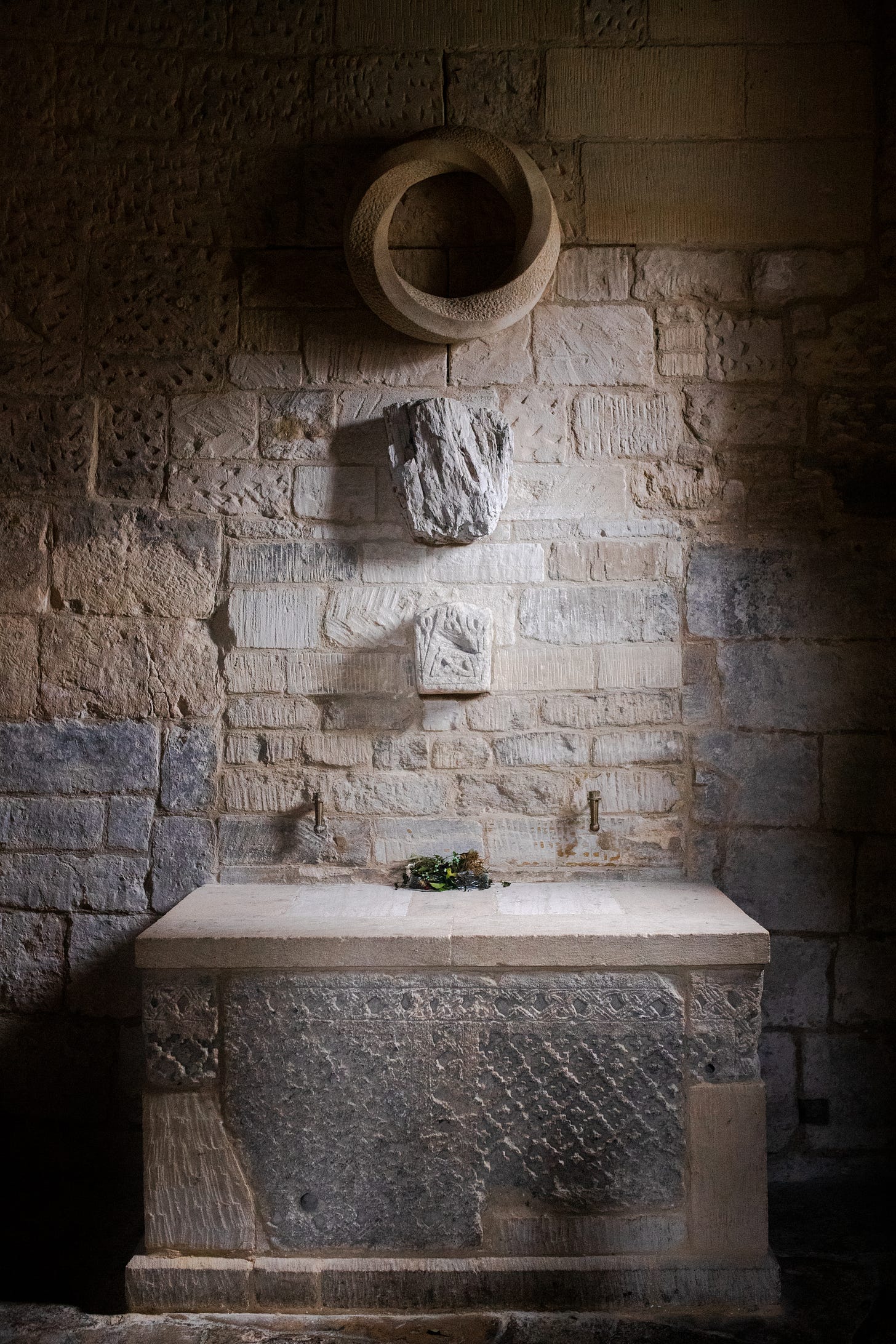
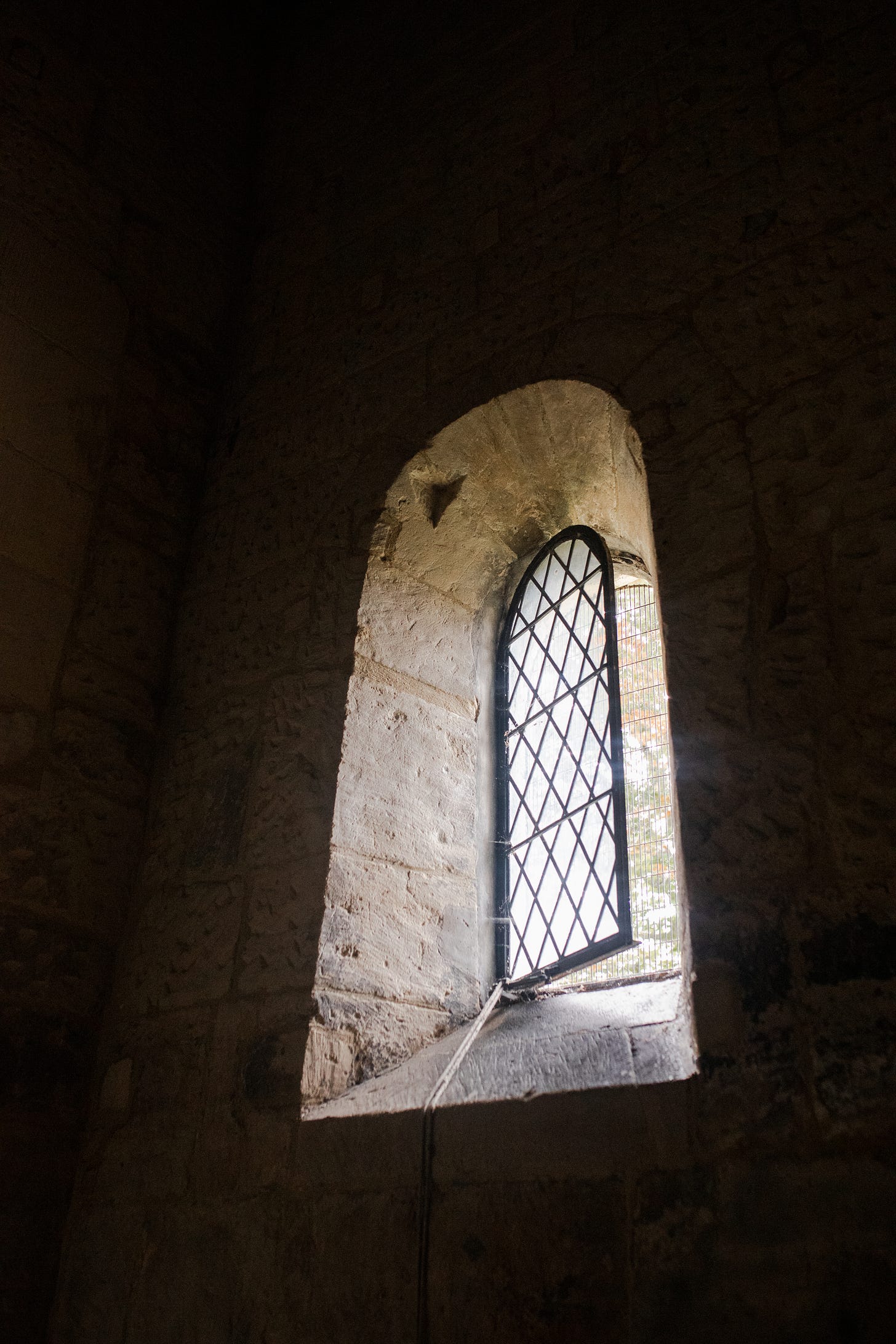
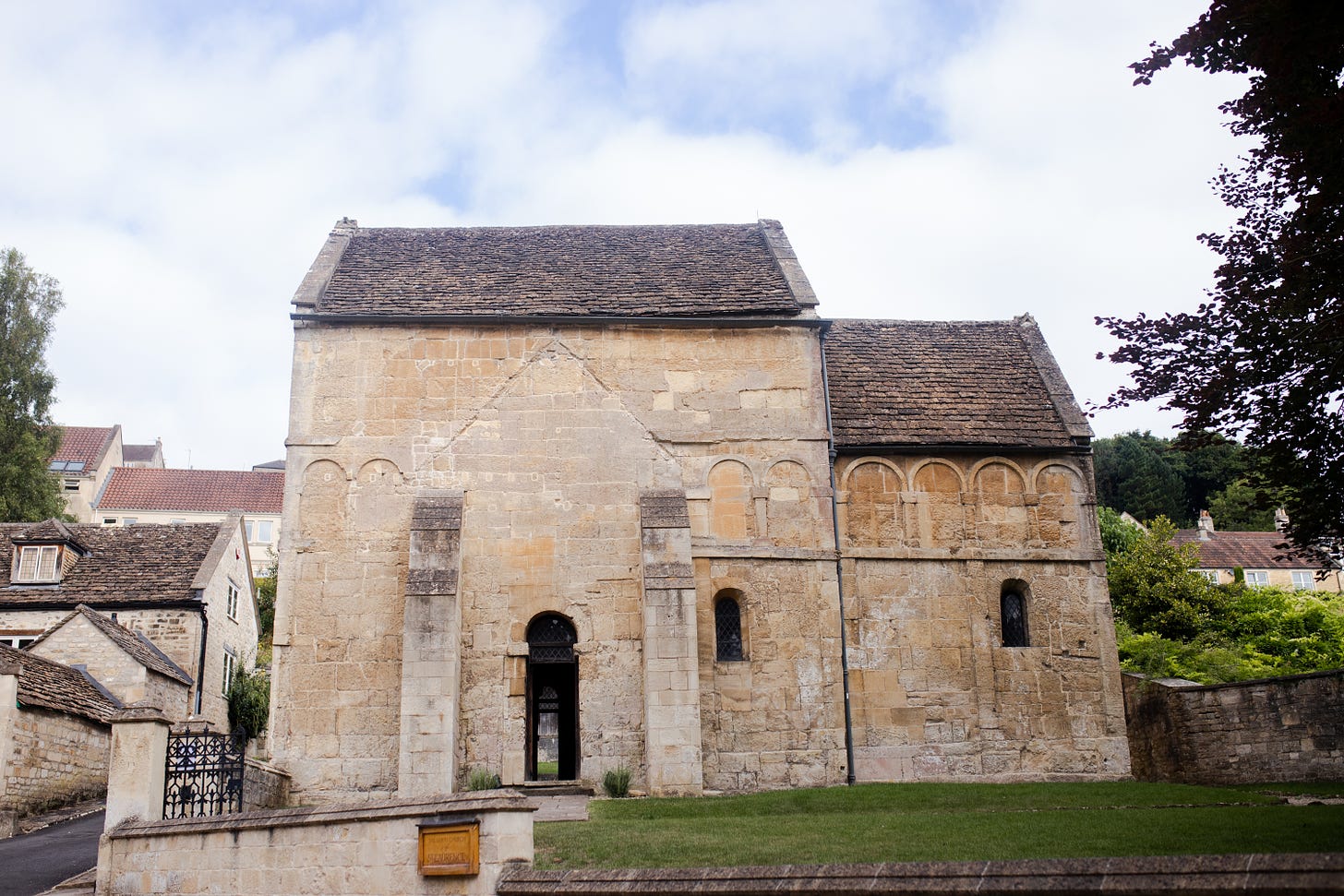

"I am joyful, and I grieve. Grief does not erase joy." This is so powerful and what I've learned to embrace and live in over the past several years. Thank you for this beautiful reminder.
What a beautiful encounter with the Lord and exploration of the mingling of grief and joy. Remember, Christina, that everything sad is coming untrue